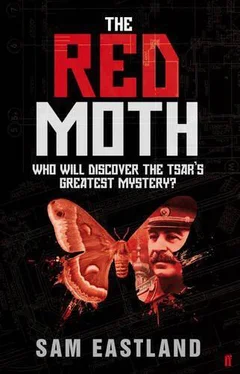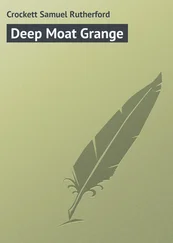Sam Eastland - Red Moth
Здесь есть возможность читать онлайн «Sam Eastland - Red Moth» весь текст электронной книги совершенно бесплатно (целиком полную версию без сокращений). В некоторых случаях можно слушать аудио, скачать через торрент в формате fb2 и присутствует краткое содержание. Жанр: Исторический детектив, на английском языке. Описание произведения, (предисловие) а так же отзывы посетителей доступны на портале библиотеки ЛибКат.
- Название:Red Moth
- Автор:
- Жанр:
- Год:неизвестен
- ISBN:нет данных
- Рейтинг книги:3 / 5. Голосов: 1
-
Избранное:Добавить в избранное
- Отзывы:
-
Ваша оценка:
- 60
- 1
- 2
- 3
- 4
- 5
Red Moth: краткое содержание, описание и аннотация
Предлагаем к чтению аннотацию, описание, краткое содержание или предисловие (зависит от того, что написал сам автор книги «Red Moth»). Если вы не нашли необходимую информацию о книге — напишите в комментариях, мы постараемся отыскать её.
Red Moth — читать онлайн бесплатно полную книгу (весь текст) целиком
Ниже представлен текст книги, разбитый по страницам. Система сохранения места последней прочитанной страницы, позволяет с удобством читать онлайн бесплатно книгу «Red Moth», без необходимости каждый раз заново искать на чём Вы остановились. Поставьте закладку, и сможете в любой момент перейти на страницу, на которой закончили чтение.
Интервал:
Закладка:
‘There may be one thing,’ replied Stefanov.
‘And what is that, Rifleman?’
‘I know the road they’ll take to get to Wilno. My father and I travelled along it every weekend in the summer, to sell the vegetables he grew in his spare time. The road passes through the forest of Murom, which is uninhabited. The locals wouldn’t go there, even to hunt‚ on account of the bogs which can swallow a man without trace.’
‘Is there somewhere on that road where those trucks can be stopped?’
‘I think so. Yes. At the far side of the forest, just where the fields begin again, the road passes over a bridge. It is a small bridge, made of wooden beams, which passes over a stream that only flows there in the spring. The rest of the year, it is dry.’
‘And if I follow that road, how long will it take me to get there?’
‘If you stay on the road, you might not get there in time,’ Stefanov replied, ‘but if we cut through the forest, I can get us there by morning.’
‘I am not asking you to bring me there. You said yourself that it’s too dangerous. You’re free to go, Stefanov.’
In the moment that followed, Stefanov was surprised to hear coming from his mouth the same words spoken by his father on that cold night back in March of 1917. ‘I would rather help you now than spend the rest of my life knowing that I could have and didn’t.’
‘Very well.’ Pekkala nodded at the dusty old bottle in Stefanov’s hand. ‘Then the least I can do is offer you a drink.’
Stefanov opened the slivovitz and, as they passed it back and forth, the brandy spread like wings of fire in their chests.
An hour later
An hour later, having slipped out through the shattered iron railings which circled the Tsar’s estate, Pekkala and Stefanov were making their way through a tangle of bulrushes on the swampy ground which bordered the forest of Murom. Stefanov had discovered a trail, so narrow that it could only have been made by the deer or wild boar that roamed the forest.
Tattered clouds rode past beneath the waning gibbous moon. Beneath its silvery light, the tasselled heads of bulrushes weaved like the patterns of heat upon an iron stove.
Suddenly, Stefanov wheeled about and motioned for Pekkala to take cover.
The two men scattered into the rushes.
A moment later, Pekkala heard the hollow thump of hooves on the soft ground. Then he saw a man on horseback coming down the path, a rifle slung across his back. From the angles of his helmet, Pekkala could tell it was a German soldier. After him came another rider, and then another after that. Peering through the screen of rushes, Pekkala counted eight riders. The horses moved slowly, tired heads bowed low. After they had passed on, the smell of their sweat lingered in the air.
Without a word, Stefanov emerged from his hiding place.
Pekkala fell in behind him and they began to move again, their senses sharpened to the danger.
An owl glided past, just above the tops of the rushes, its silhouette like some grim coagulation of the darkness. As it came level with Pekkala, only an arm’s length away, it turned its flat, round head and blinked at him with dead man’s eyes.
They had not gone far when Stefanov halted once again. ‘What’s that sound?’ he asked.
Pekkala strained to hear above the rustling of the leaves. He thought it might be thunder or a gust of wind approaching. Then suddenly he felt a tremor from the ground beneath his feet. ‘They’re coming back!’ he hissed.
Once more, Pekkala dived off the path, pawing through the bulrushes, sweeping them aside to get away. He heard shouting as he ran, but it seemed to be coming from above, as if creatures were descending from the night sky. All around, the rushes thrashed and crackled. In the next instant, the huge, black shape of a horse swept past him, static electricity crackling across its flanks. Shreds of blue-green flame tangled in the animal’s tail, sparking up the rider’s legs until it reached his arms and, outlined in that fire, the two transformed into a single beast. With a ring of unsheathed metal, the curve of a sabre blade flashed and hung suspended in the air above their heads, as if it were the stalled path of a meteor.
Blindly, Pekkala stumbled forward through the reeds, feet sinking in the mud and the Mauser rifle, on its leather sling across his back, dragging through the rushes like an anchor. The same bright static swam around him; emeralds streaming through his fingers. He could not unshoulder the rifle without stopping, so struggled instead to draw the Webley from its holster. But it was too late.
The air filled with the terrible snorting breath of the horse and the high-pitched shriek of the rider as a burning stripe of pain flashed across Pekkala’s shoulder blades. The earth seemed to disappear from beneath him as he lost his footing. With a shout that emptied his lungs, he tumbled to the ground.
The horse passed over him, hooves trailing sparks and clods of dirt. In another second it was gone, ploughing through the rushes, the rider still howling in the darkness.
Sure that he had been cut down by the cavalryman’s sword, Pekkala had the sensation of being turned loose from the clumsy fastenings of his body. In what he did not doubt was the moment of his death, he seemed to leap into the sky unfolding wings from his back like those of a dragonfly from the papery husk of its larva.
From far above, Pekkala looked down upon the field of rushes, where the paths of the horses spread out green through the black. He saw the cowering figure of Stefanov, and of the other riders, all of them varnished with moonlight.
Then Pekkala tumbled back to earth and lay there‚ dazed‚ among the trampled rushes, in too much pain to be anything other than alive.
His rifle had gone. He had no idea where, and the leather Y-straps which had held his field equipment lay tangled in a heap beside him.
Rolling on to his back, Pekkala tore open the top buttons of his tunic and put his hand against his chest, searching for a puncture wound. But he felt only skin and sweat. Next, he reached down the back of his neck, dabbing at the bruise where, he now realised, the cavalryman had caught his blade against the Mauser, severing the rifle strap, together with the thick leather of his equipment harness.
A sub-machine gun roared, somewhere out there in the thicket. Then Pekkala heard the terrible shriek of a wounded horse and the thump of horse and rider going down together.
Shouts reached across the swaying rushes. The cavalrymen were calling to each other.
The machine gun fired once more in a long burst which was followed by silence. A moment later, he heard a rattle as someone removed a magazine and the dull clank as the person tapped a new magazine against their helmet to settle the rounds before inserting it into the weapon.
The voices of the riders grew fainter. A moment later, they were gone.
‘Pekkala!’ shouted Stefanov. ‘Pekkala, are you out there?’
‘Yes!’ he called back. ‘I just got knocked down. That’s all.’ Painfully, he clambered to his feet. Pekkala gathered up his rifle, which had a deep gash in the wooden stock, and slung the gas-mask canister over his shoulder. The rest of his equipment he left lying on the ground amongst the mangled leather straps of his combat harness.
Making his way out to the path, Pekkala found Stefanov standing over the body of a wounded horse. The animal lay on its side, its wide eyes glistening. The saddle had remained strapped to its back. Stirrups trailed upon the ground like the leg braces of a crippled child. Blood, as black as tar, pulsed from the horse’s neck, and the sound of its laboured breathing filled the air.
Stefanov still gripped the German gun with which he had brought down the animal, as if he meant to shoot it once again.
Читать дальшеИнтервал:
Закладка:
Похожие книги на «Red Moth»
Представляем Вашему вниманию похожие книги на «Red Moth» списком для выбора. Мы отобрали схожую по названию и смыслу литературу в надежде предоставить читателям больше вариантов отыскать новые, интересные, ещё непрочитанные произведения.
Обсуждение, отзывы о книге «Red Moth» и просто собственные мнения читателей. Оставьте ваши комментарии, напишите, что Вы думаете о произведении, его смысле или главных героях. Укажите что конкретно понравилось, а что нет, и почему Вы так считаете.











